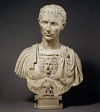|
Julius Caesar - Character
|
 For Caesar, the verdict of history has always been colored by the political sympathies of the commentators. All seem to recognize his commanding genius, and few have failed to do justice to his personal charm and magnanimity, which almost even won the heart of Cicero, who rarely appealed in vain to his clemency.
For Caesar, the verdict of history has always been colored by the political sympathies of the commentators. All seem to recognize his commanding genius, and few have failed to do justice to his personal charm and magnanimity, which almost even won the heart of Cicero, who rarely appealed in vain to his clemency.
Indeed, he was singularly tolerant of all but intellectual opposition. His private life was not free from scandal, especially in his youth, but it is difficult to believe the worst of the tales which were circulated by his opponents, e.g. as to his relations with Nicomedes of Bithynia.
As to his public character, however, no agreement is possible between those who regard Caesarism as a great political creation, and those who hold that Caesar, by destroying liberty, lost a great opportunity and crushed the sense of dignity in mankind. The latter view is unfortunately confirmed by the undoubted fact that Caesar treated with scant respect the historical institutions of Rome, which with their magnificent traditions might still have been the organs of true political life.
He increased the number of senators to 900 and introduced provincials into that body; but instead of making it into a grand council of the empire, representative of its various races and nationalities, he treated it with studied contempt, and Cicero writes that his own name had been set down as the proposer of decrees of which he knew nothing, conferring the title of king on potentates of whom he had never heard. A similar treatment was meted out to the ancient magistracies of the republic; and thus began the process by which the emperors undermined the self-respect of their subjects and eventually came to rule over a nation of slaves.
Few men, indeed, have partaken as freely of the inspiration of genius as Julius Caesar; few have suffered more disastrously from its illusions.
Julius Caesar
Rome
the Eternal City
Sitemap
Travel
|

